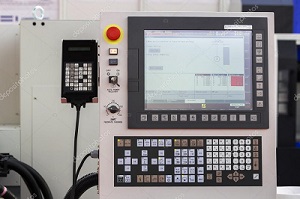Posted on 9th Sep 2023

According to CM Industry Supply Automation - Servo Drive & Servo Motor Expert, the precursor to CNC machining was numerical control (NC), which emerged in the late 1940s and early 1950s. NC involved using punched cards or tapes to control the movements of machine tools. These systems allowed for more accurate and efficient machining compared to manual methods. They were initially employed in aerospace and defense industries to produce complex components.
The term "Computer Numerical Control" came into use in the 1960s as digital computers started to replace the punched cards and tapes of traditional NC systems. This transition marked a significant advancement, enabling the use of computer programs to control machining operations. CNC machines could follow detailed instructions provided through code, allowing for greater flexibility and precision.
The application of CNC machining in the automobile industry gained momentum during the 1970s and 1980s.
As vehicles became more sophisticated and demanded higher precision in manufacturing, CNC machining became an ideal solution. The precision and automation offered by CNC technology allowed for the production of intricate and accurate components required for modern vehicles.
Here are some key applications of CNC machining in the automobile industry:
Engine Components:
CNC machining is extensively used to manufacture engine components such as cylinder heads, engine blocks, crankshafts, pistons, and camshafts. These parts require tight tolerances and precise geometries to ensure optimal performance and efficiency.
Transmission Parts:
According to CM Industry Supply Automation - Servo Drive & Servo Motor Expert, CNC machining is employed to fabricate transmission components like gears, shafts, housings, and clutch assemblies. The precision and consistency offered by CNC machining are essential to ensure smooth gear shifts and overall transmission performance.
Suspension and Steering:
Suspension and steering components like control arms, ball joints, tie rods, and steering knuckles are manufactured using CNC machining. Accurate machining is vital to maintain proper alignment and stability in a vehicle's suspension and steering systems. 2
Brake Components:
CNC machining is utilized for producing brake calipers, brake brackets, and other brake system parts. These parts require precise dimensions to ensure reliable and responsive braking performance.
Interior and Exterior Trim:
Many interior and exterior trim components, such as dashboard panels, door handles, grilles, and decorative elements, are manufactured using CNC machining. This allows for intricate designs and precise detailing.
Wheels and Rims:
CNC machining is used to create complex wheel designs and produce high-quality rims. The process ensures accurate dimensions and a balanced wheel structure for safe and smooth driving.
Exhaust System Components:
According to CM Industry Supply Automation - Servo Drive & Servo Motor Expert, Various components of the exhaust system, including exhaust manifolds and pipes, are manufactured using CNC machining. This helps in achieving proper exhaust flow and emissions control.
Prototype Development:
Before mass production, CNC machine is often used to create prototypes of new vehicle parts. This allows engineers to test and refine designs before committing to large-scale production.
Customization:
CNC machining enables the customization of certain automotive components based on customer preferences. This includes personalized trim pieces, interior accents, and aftermarket performance parts.
Tool and Die Production:
CNC machining is employed to create molds, dies, and tooling used in various manufacturing processes within the automotive industry. These tools are essential for processes like stamping, casting, and injection molding.
Advantages of CNC Machining for Automotive Applications
According to CM Industry Supply Automation - Servo Drive & Servo Motor Expert, CNC (Computer Numerical Control) machining offers several advantages when applied to automotive manufacturing processes. These advantages have contributed to its widespread adoption in the industry. Here are some key benefits of using CNC machining for automotive applications:
Precision and Accuracy:
CNC machining ensures a high degree of precision and accuracy in manufacturing automotive components. Complex geometries, tight tolerances, and intricate designs can be consistently achieved, resulting in parts that fit together seamlessly and perform optimally.
Repeatability and Consistency:
According to CM Industry Supply Automation - Servo Drive & Servo Motor Expert, CNC machines can reproduce the same part with consistent accuracy across multiple production cycles. This level of repeatability is crucial for maintaining the quality and reliability of automotive components in mass production.
Reduced Human Error:
CNC machining eliminates many sources of human error that can occur during manual machining processes. This leads to fewer defects and increased product reliability, enhancing overall vehicle safety.
Flexibility and Customization:
CNC machines can be programmed to create a wide variety of automotive components. This flexibility allows for the production of customized parts to meet specific vehicle requirements or consumer preferences.
Complex Geometry:
CNC machining can handle complex shapes and intricate features that would be difficult or impossible to achieve using traditional machining methods. This is especially beneficial for producing modern, aerodynamic, and lightweight automotive designs.
Reduced Lead Times:
CNC machining reduces the time required to design, prototype, and manufacture automotive components compared to traditional methods. This agility is essential in meeting rapidly changing market demands.
Cost Efficiency:
While the initial investment in CNC machinery and programming can be significant, the long-term cost benefits are evident through reduced labor costs, lower material waste, and increased production efficiency.
Quality Control and Inspection:
CNC machining often integrates automated quality control measures, such as in-process inspections and measurements, ensuring that each part meets specified standards before leaving the production line.
Material Versatility:
CNC machining can work with a wide range of materials used in the automotive industry, including metals, plastics, composites, and more. This versatility allows for the creation of diverse components.
Prototyping and Testing:
CNC machining facilitates the rapid production of prototypes and test parts, enabling engineers to evaluate designs and functionality before committing to full-scale production.
Overall, CNC machining enhances the efficiency, precision, and quality of manufacturing processes in the automobile industry. It enables the production of complex and accurate parts that contribute to the performance, safety, and aesthetics of vehicles.